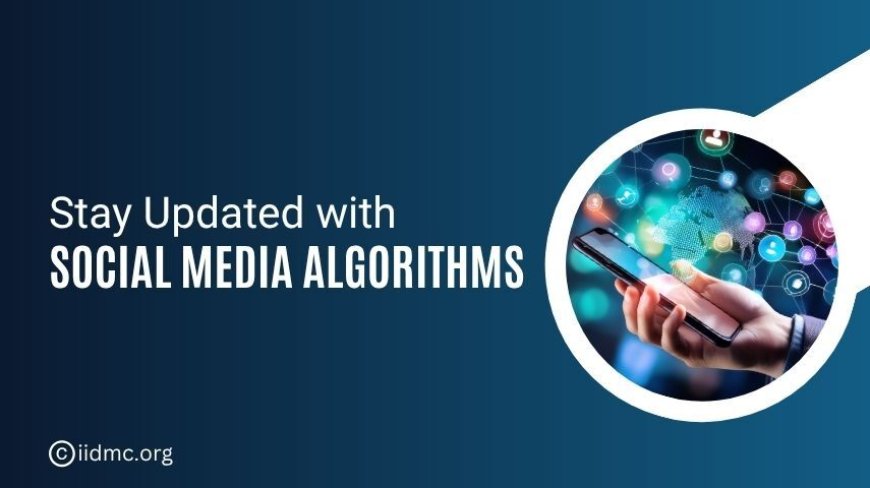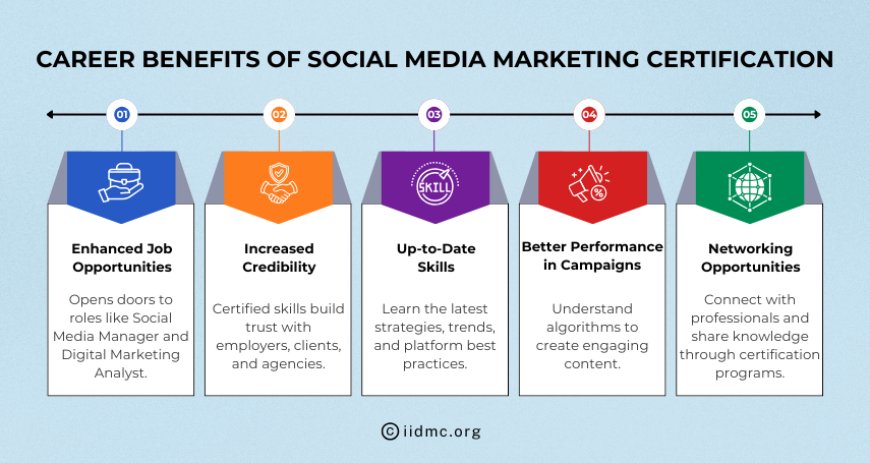How to Keep Up with Social Media Marketing Algorithm Changes
Stay updated with social media algorithm changes. Learn simple ways to adapt your marketing strategy, boost reach, and keep your audience engaged.

Have you ever noticed your social media posts suddenly getting less reach or engagement without any clear reason? That’s often the result of social media algorithm changes, which decide what content users see on their feeds.
Staying updated with these changes is essential for businesses and marketers who want to maintain visibility and drive results. By understanding how algorithms work and adapting your strategies, you can improve engagement, reach, and conversions. Learning about Social Media Marketing and completing a Social Media Marketing Certification can help you stay skilled and succeed.
Understanding Social Media Algorithms
Algorithms are mathematical models used by social media platforms to prioritize content that users are most likely to engage with. Understanding these algorithms is crucial for effective social media marketing.
Key elements of social media algorithms:
-
Engagement Signals: Content that generates more interactions (likes, comments, shares, saves) is prioritized.
-
Relevance and Personalization: Algorithms track user behavior, preferences, and past interactions to show content that aligns with individual interests.
-
Content Format: Certain formats like short-form video, carousels, and live videos are favored depending on the platform.
-
Recency: Fresh content often gets more visibility compared to older posts.
Example: Instagram favors Reels over static images because the platform wants users to engage with trending short-form content. LinkedIn, on the other hand, prioritizes posts that spark professional conversations, encouraging meaningful interactions.
Why Algorithms Keep Changing
Social media platforms are continually updating their algorithms for several reasons:
-
Improving User Experience: Platforms aim to keep users engaged by showing the most relevant and interesting content.
-
Reducing Spam and Low-Quality Content: Algorithm updates filter out clickbait and irrelevant posts to maintain credibility.
-
Encouraging New Features: Updates often promote features like Reels, Stories, or live videos to keep content formats fresh and interactive.
-
Optimizing Monetization: Platforms prioritize content that aligns with paid promotions and ad campaigns, ensuring advertisers get value.
Algorithm changes can disrupt campaigns, reduce reach, or require adjustments to posting strategies. Staying updated ensures that marketers are proactive rather than reactive.
Impact of Algorithm Changes on Social Media Marketing
Algorithm updates directly affect digital marketing performance:
-
Reduced Organic Reach: Even high-quality content may not appear on users’ feeds without adaptation.
-
Decreased Engagement: Comments, shares, and likes may drop if the content doesn’t align with algorithmic priorities.
-
Content Strategy Shifts: Marketers may need to adopt new formats, posting schedules, or engagement techniques.
-
Increased Competition: With algorithms favoring certain types of content, brands that do not adapt may lose visibility to competitors.
How to Stay Updated and Adapt
Staying informed is important for adapting to algorithm changes. Here’s how marketers can do it effectively:
a) Follow Official Platform Updates
-
Platforms like Meta (Facebook, Instagram), LinkedIn, TikTok, and X provide official announcements on updates and features.
-
Following these blogs ensures you receive accurate information directly from the source.
b) Join Professional Communities
-
Social media marketing groups on LinkedIn, Facebook, and Reddit allow marketers to exchange experiences and strategies.
-
Being part of these communities provides early insights into algorithm impacts that may not be widely reported yet.
c) Subscribe to Industry Blogs and Newsletters
-
Trusted blogs include Social Media Examiner, HubSpot, Buffer, Sprout Social, and Later.
-
These sources often provide analysis, case studies, and practical tips for adapting campaigns.
d) Track Metrics and Performance Regularly
-
Use analytics tools like Google Analytics, Hootsuite, Sprout Social, and native platform insights.
-
Compare engagement metrics before and after updates to identify trends and content gaps.
e) Experiment and Test
-
Try new content types like short-form video, polls, carousel posts, and live sessions.
-
Adjust posting frequency, timing, and audience targeting to see what works best under new algorithm rules.
-
Analyze results and refine strategies regularly.
Using Social Media Marketing Certification
A Social Media Marketing Certification equips professionals with the knowledge and skills to handle platform updates effectively. Benefits of certification:
-
Up-to-date Learning: Certifications provide insights into the latest platform trends and algorithm updates.
-
Structured Approach: Learn best practices for content creation, engagement, and analytics.
-
Industry Recognition: Certification demonstrates credibility to clients, employers, and peers.
-
Practical Application: Most courses include exercises and case studies that allow real-world practice.
Top Social Media Marketing Certifications
Earning a Social Media Marketing Certification is a great way to improve your skills and grow your career. The International Institute of Digital Marketing Certifications (IIDMC) offers certifications that are recognized globally and help professionals learn the latest trends, strategies, and platform algorithms.
Why choose IIDMC certifications:
-
Industry-Recognized: IIDMC certifications are accepted internationally, giving your resume more credibility.
-
Updated Curriculum: Learn the newest techniques in Social Media Marketing, content creation, analytics, and overall digital strategy.
-
Practical Skills: Gain real experience in running social media campaigns on platforms like Facebook, Instagram, LinkedIn, TikTok, and X.
-
Career Opportunities: These certifications help you qualify for roles like Social Media Manager, Digital Marketing Specialist, and Content Strategist.
-
Expert Guidance: Learn from instructors with real-world experience in digital marketing.
Common Mistakes During Algorithm Updates
Social media algorithms change frequently, and marketers often face challenges when trying to maintain engagement and reach. Understanding common mistakes can help you avoid pitfalls and adapt effectively.
Key mistakes marketers make during algorithm updates:
-
Ignoring Analytics: Many marketers continue posting without checking engagement metrics. Without analyzing data, it’s impossible to know which content performs well under the new algorithm.
-
Sticking to Outdated Strategies: What worked last month may no longer work. Platforms prioritize new content formats or interaction types, so failing to adjust strategies can reduce reach.
-
Over-Reliance on Automation: Scheduling tools and automation are helpful, but relying on them entirely can harm performance. Algorithms favor authentic engagement, so personal interaction is essential.
-
Neglecting Continuous Learning: Social media marketing is dynamic. Professionals who do not update their skills or take certifications risk falling behind.
How to avoid these mistakes:
-
Regularly track analytics and monitor post performance.
-
Experiment with different content formats such as videos, Reels, carousels, or interactive posts.
-
Engage personally with your audience through comments, polls, and messages.
-
Invest in learning through Social Media Marketing and digital marketing certification courses to stay updated with the latest trends.
By avoiding these mistakes, marketers can maintain engagement, improve content performance, and achieve consistent results even after algorithm updates.
Career Benefits of Social Media Marketing Certification
Earning a Social Media Marketing Certification is more than just a credential, it equips professionals with practical skills to excel in the dynamic world of digital marketing. Certifications provide both theoretical knowledge and hands-on strategies to manage social media effectively. Major career benefits include:

-
Enhanced Job Opportunities: Certification opens doors to roles like Social Media Manager, Digital Marketing Analyst, Content Strategist, and Social Media Consultant.
-
Increased Credibility: Employers and clients value certified skills, which can help freelancers and agencies gain trust and win more projects.
-
Up-to-Date Skills: Certified courses teach the latest strategies, algorithm trends, and platform-specific best practices.
-
Better Performance in Campaigns: Understanding algorithm behavior allows marketers to create content that performs well and drives engagement.
-
Networking Opportunities: Certification programs often provide access to communities of professionals, allowing knowledge sharing and collaboration.
Future Trends in Social Media Algorithms
Social media algorithms continue to evolve quickly, and understanding future trends helps marketers stay ahead. These trends influence how content is prioritized and how brands engage with their audience. Key trends include:
-
AI and Machine Learning: Platforms will increasingly use AI to personalize content, showing users posts that match their preferences. Marketers will need to create content that resonates with specific audience segments.
-
Focus on Authentic Engagement: Algorithms will prioritize meaningful interactions like comments, shares, and saves rather than superficial likes. Content that fosters conversations and community will perform better.
-
Rise of Short-Form and Interactive Content: Videos, Reels, polls, and stories are becoming more important as algorithms favor engaging, dynamic content.
-
Community and Niche Content: Algorithms may favor groups, communities, or content targeted to niche audiences, helping marketers connect with more relevant users.
-
Data-Driven Decision Making: Understanding analytics and performance metrics will be critical for adjusting strategies based on algorithm updates.
Keeping up with social media marketing algorithm changes requires staying informed, being flexible, and continuously testing your strategies. By regularly monitoring updates from platforms, analyzing your content performance, and adapting your approach to match new rules, you can maintain visibility, engagement, and reach. Consistency, creativity, and a focus on providing value to your audience will help your social media efforts remain effective despite constant changes.




























